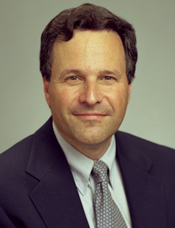Tradition Meets Innovation at Post-Merger MET
New programs seek to fill industry needs

Although they are a surprisingly large segment of the student population at many universities, continuing education students are often an afterthought for administrators.
At Metropolitan College, however, that’s not the case. Following MET’s merger last year with the Division of Extended Education, Dean Jay Halfond has helped the college become a major player on campus, with innovative educational programs geared to nontraditional students. People like Bob Fritz are taking advantage of the college’s unique opportunities.
Fritz, a 51-year-old software quality engineer who works at EMC in Hopkinton, has been taking classes at MET for three years and graduates this May with a master’s degree in administrative sciences. He says that MET classes have given him the perfect chance to expand his professional options. “For me, this has been an awesome opportunity and an awesome challenge,” he says.
“Many universities tend to overlook the nontraditional students,” Halfond says. “As a result, programs for them are usually not always good quality, because they are developed cheaply and poorly.” MET’s focus, he says, is academic excellence.
Fritz has taught as adjunct faculty in similar programs at Daniel Webster College and Worcester Polytechnic Institute, but, he says, the programs offered by MET stand above the rest.
“Other colleges can offer a lot of programs for adults,” he says, “but I think BU tries to tailor its program to what’s current in the industry.”
As a prime example of that forward thinking, Tanya Zlateva, MET associate dean for academic programs and an associate professor of computer science, cites the college’s computing security program. Despite a soft market for corporate computing classes because of the growth of outsourcing when the program was launched four years ago, it has since exploded. Today it enrolls more than 300 students.
“The one thing that clearly was an overriding need was information security,” she says. “MET’s computer science programs recognized it very early on and developed a program. This is the kind of thing Metropolitan College does very well. It recognizes a need and builds a curriculum for that need.”
Add MET’s mix of full-time and adjunct faculty drawn from the professional ranks, Fritz says, and the experience for students is tough to beat.
“They stay on the cutting edge by updating the programs constantly,” he says. “The industry and technology are constantly evolving and changing, so what’s current today may be archaic or old-fashioned a year or two from now. They’re really interested in looking ahead for emerging trends in industry and bringing that into the classroom and causing students to think about their profession.”
Students like Fritz, Halfond believes, have helped to raise the college’s profile both on and off campus and pushed MET’s long overshadowed work into the limelight.
While the development of new programs has been exciting, Halfond and other administrators say, the college’s focus has remained on what’s most important: academics.
“The focus has been to give prominence to the academic side,” says Zlateva. “It is, in a sense, a very traditional, academically rigorous program and curriculum that address a nontraditional clientele.”
That means students like Kevin Coleman, an employee of Fidelity Investments in Merrimack, N.H., who’s studying for a master of science degree from MET. “I’m looking to transform my career from software development into management,” he says. “I want to leverage the experience I’ve had in my professional career.”
While the BU name was part of the reason Coleman chose MET over other schools, he says it was the combination of rigorous classroom work and real-world experience offered by instructors that convinced him.
“A lot of folks from academia don’t have a solid real-world grasp,” he says. “But some instructors are businesspeople like us. They know the game. They bring to the table the same issues we deal with. ”
For Ruth Ann Murray, the director of MET’s Center for Professional Education, achieving recognition in the world isn’t hard — it’s MET’s visibility on campus that’s lacking. “We don’t have any problem attracting students and having them see the value of our programs,” she says. “But within Boston University, we’re still not very well known.”
With last year’s merger behind them, Halfond hopes to see that change.
“I’m tired but excited,” he says. “I have to work pretty hard, but I have the honor of working with great people and doing exciting things. Most universities have something like MET, but no one has anything just like it.”